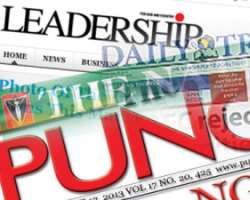Outrage trails military clampdown on newspapers

In what looks like a return to jackboot dictatorship, the military and the Department of State Security (DSS) yesterday mopped up and destroyed copies of some Nigerian newspapers across the nation.
It was gathered that copies of the Punch newspaper were seized at the Murtala Muhammed International Airport, Ikeja Lagos while distribution vans of media houses were stopped and searched at random in different parts of the country.
In the same vein, newspaper distributors also complained that several copies of The Nation, Leadership and Daily Trust were at different times and parts of the country confiscated. In the case of the Punch, copies were torn while the covers of some were damaged.
The development has however irked the Nigerian Guild of Editors, NGE who described the assault on publishing houses across the country as unacceptable.
According to a statement by the Guild's President, Mr Femi Adesina, he said the Guild was 'scandalised and shocked to the marrows by conduct of security agents, particularly the military, which laid siege to the roads round the country on Friday, and seized consignments of newspapers meant to be sold to the general public. The crackdown lasted throughout the morning hours, causing huge economic losses to the publishing houses.'
'This explanation from the military is unacceptable to us. In fact, it goes a long way to reinforce the apocryphal belief quite commonplace among security agencies that they are much more patriotic than anybody else. Apparently, they had been itching to open a battlefront with the country's ever-irrepressible media, and thus hid behind a smokescreen to deal a lethal blow at the economic jugular of newspapers. The media do not bear arms, rather we bear information, which sheds light on darkness, no matter how seemingly impenetrable the darkness is. Information sets free. It emancipates from shackles. It develops the mind, and helps people to make independent, rational judgments. Let no one accuse the media of any flimsy and nebulous security breach, and hide under that umbrella to traumatise us. Count the media out of anything not designed for the cohesion and general good of our country.'
While stating that 'these are perilous times in Nigeria', the NGE stressed that 'the military and other security agencies, as well as the media, have all been at the receiving end of the evils of insurgency.'
It warned that 'for the military, which already has its hands full, to open another flank of battle against the media is indefensible, even downright ridiculous', adding that 'It is a throwback to the days of military repression, which we thought we had long put behind us as a country.'
'We reject the label of bearer of arms, or any other form of ordnance, to do mischief against our own country. If the siege arose out of the need to call the dog a bad name in order to hang it, Nigerian editors roundly and soundly reject such negative profiling', it added.
In its account of the assault, the management of Leadership newspapers said: 'Soldiers on Friday (yesterday) intercepted and destroyed newspaper copies meant for the North-West region at the Kaduna tollgate. The copies booked for South-South and South-East regions were also seized by the soldiers.'
The paper further said that the soldiers and SSS operatives said they acted on 'orders from above.'
In its own narration, The Nation said that its distribution vans were stopped by soldiers who 'waylaid the vans around the Area 1 Road, commanding the drivers to unload. The same scenario occurred in Benin/Warri Road, Port Harcourt, Kaduna/Kano Road and Nasarwa/ Jos Road'
It added that soldiers of the 3 Battalion of the Nigerian Army confiscated copies of the paper meant for Warri and Benin axis at Okwuoko in Delta State.
The Director of Defence Information, Major Chris Olukolade, in his response to the outrage trailing the attack on media houses said that troops acted on intelligence report which revealed that dangerous materials were transported alongside the newspapers.
'Troops this morning embarked on thorough search of vehicles conveying newspapers across board. This followed intelligence report indicating movement of materials with grave security implications across the country using the channel of newsprint related consignments', he said.
He further said the exercise had nothing to do with the content, operations, and personnel of the media organizations.
'The general public and the affected media organizations in particular are assured that the exercise was a routine security action and should not be construed for any other motive', he added.
